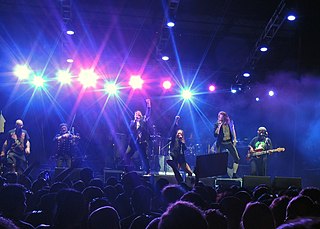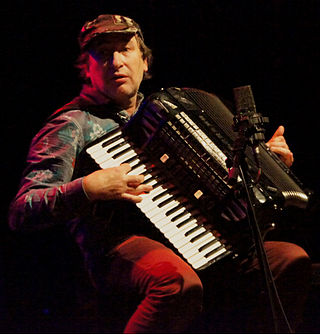Rock is a broad genre of popular music that originated as "rock and roll" in the United States in the late 1940s and early 1950s, developing into a range of different styles from the mid-1960s, particularly in the United States and the United Kingdom. It has its roots in 1940s and 1950s rock and roll, a style that drew directly from the blues and rhythm and blues genres of African-American music and from country music. Rock also drew strongly from genres such as electric blues and folk, and incorporated influences from jazz and other musical styles. For instrumentation, rock has centered on the electric guitar, usually as part of a rock group with electric bass guitar, drums, and one or more singers. Usually, rock is song-based music with a 4
4 time signature using a verse–chorus form, but the genre has become extremely diverse. Like pop music, lyrics often stress romantic love but also address a wide variety of other themes that are frequently social or political. Rock was the most popular genre of music in the U.S. and much of the Western world from the 1950s to the 2010s.

The Romani, also spelled Romany or Rromani and colloquially known as the Roma, are an ethnic group of Indo-Aryan origin who traditionally lived a nomadic, itinerant lifestyle. Linguistic and genetic evidence suggests that the Romani originated in the Indian subcontinent, in particular the region of present-day Rajasthan. Their subsequent westward migration, possibly in waves, is now believed by historians to have occurred around 1000 CE. Their original name is from the Sanskrit word डोम, doma and means a member of the Dom caste of travelling musicians and dancers. The Roma population moved west into the Persian Ghaznavid Empire and later into the Byzantine Empire. The Roma are thought to have arrived in Europe around the 13th to 14th century. Although they are widely dispersed, their most concentrated populations are located in Bulgaria, Hungary, Romania, Spain, and Turkey.

Romani music is the music of the Romani people who have their origins in northern India but today live mostly in Europe.
Hungary has made many contributions to the fields of folk, popular and classical music. Hungarian folk music is a prominent part of the national identity and continues to play a major part in Hungarian music. The Busójárás carnival in Mohács is a major folk music event in Hungary, formerly featuring the long-established and well-regarded Bogyiszló orchestra. Instruments traditionally used in Hungarian folk music include the citera, cimbalom, cobza, doromb, duda, kanászkürt, tárogató, tambura, tekero and ütőgardon. Traditional Hungarian music has been found to bear resemblances to the musical traditions of certain countries within the neighbouring Balkans and the Caucasus.

Firewater is an American band founded by American singer/instrumentalist Tod A. in New York City in 1995, after the breakup of his previous group Cop Shoot Cop. A self-described "world punk" band, Firewater incorporate diverse elements of world music with punk rock rhythms, including cabaret, ska, jazz, folk and most notably Eastern European influences such as klezmer and gypsy music, which has led to their inclusion in the gypsy punk genre.

Gogol Bordello is an American punk rock band from the Lower East Side of Manhattan, formed in 1999 by musicians from all over the world and known for theatrical stage shows and persistent touring. Much of the band's sound is inspired by Romani and Ukrainian music mixed with punk and dub, incorporating accordion and violin.
Celtic rock is a genre of folk rock, as well as a form of Celtic fusion which incorporates Celtic music, instrumentation and themes into a rock music context. It has been prolific since the early 1970s and can be seen as a key foundation of the development of successful mainstream Celtic bands and popular musical performers, as well as creating important derivatives through further fusions. It has played a major role in the maintenance and definition of regional and national identities and in fostering a pan-Celtic culture. It has also helped to communicate those cultures to external audiences.
Folk punk is a fusion of folk music and punk rock. It was popularized in the early 1980s by The Pogues in England, and by Violent Femmes in the United States. Folk punk achieved some mainstream success in that decade. In more recent years, its subgenres Celtic punk and Gypsy punk have experienced some commercial success.

Eugene Hütz is a Ukrainian-born singer, composer, disc jockey and actor, most notable as the frontman of the Gypsy punk band Gogol Bordello.
Celtic fusion is an umbrella term for any modern music which incorporates influences considered "Celtic", or Celtic music which incorporates modern music. It is a syncretic musical tradition which borrows freely from the perceived "Celtic" musical traditions of all the Celtic nations, as well as from all styles of popular music, it is thus sometimes associated with the Pan-Celtic movement. Celtic fusion may or may not include authentic traditional music from any one tradition under the Celtic umbrella, but its common characteristic is the inspiration by Celtic identity.
Celtic punk is punk rock mixed with traditional Celtic music.

The Romani people are a distinct ethnic and cultural group of peoples living all across the globe, who share a family of languages and sometimes a traditional nomadic mode of life. Though their exact origins are unclear, central India is a notable point of origin. Their language shares a common origin with, and is similar to, modern-day Gujarati and Rajasthani, borrowing loan words from other languages as they migrated from India. In Europe, even though their culture has been victimized by other cultures, they have still found a way to maintain their heritage and society. Indian elements in Romani culture are almost non-existent, with the exception of their language. Romani culture focuses heavily on family. The Roma traditionally live according to relatively strict moral codes. The ethnic culture of the Romani people who live in central, eastern and southeastern European countries developed through a long, complex process of continuous active interaction with the culture of their surrounding European population.

Yuri Lemeshev is an American accordion player and former member of gypsy punk band Gogol Bordello.
Pop music in Ukraine is Western influenced pop music in its various forms that has been growing in popularity in Ukraine since the 1960s.

Balkan brass, popularly known by the Serbian name Truba, is a distinctive style of music originating in the Balkan region as a fusion between military music and folk music. In recent years, it has become popular in a techno-synth fusion throughout Europe, and in pop music in the Anglo-American sphere and throughout the world. Songs like Worth It by Fifth Harmony and Talk Dirty by Jason Derulo have brought the style to a new audience. In traditional form, it is popular throughout the Balkans, especially in Serbia, North Macedonia, Bulgaria, Moldova, and Romania, although the turbo-folk variety attracts larger audiences. The energetic and fast beats encourage dance and are egalitarian, often resulting in participation by the entire audience; this unpretentious relationship with audiences, highly charged energy and loud and joyful performances by highly skilled musicians has contributed to its successes. Fans of bands inspired by Balkan bands, such as Gogol Bordello, often state that it is a type of music better experienced than listened to.
A number of overlapping punk rock subgenres have developed since the emergence of punk rock in the mid-1970s. Even though punk genres at times are difficult to segregate, they usually show differing characteristics in overall structures, instrumental and vocal styles, and tempo. However, sometimes a particular trait is common in several genres, and thus punk genres are normally grouped by a combination of traits.

La Mano Ajena is a Chilean band founded in 2002 that mixes rhythms from Eastern Europe, Latin America, France and Russia, blending all these sounds in a pastiche that also unites the tendencies of each member of the band: rock, punk, Latin American folklore and theater music. This musical project is unique in Chile, and its hybrid sound has been called "klezmer a la chilena" by press.
Gogol Bordello Non-Stop is a 2008 music documentary film, written and directed by Margarita Jimeno and starring Gogol Bordello and Eugene Hütz.
Frenchy and the Punk are a Euro-American Acoustic Alternative post-punk cabaret duo based in New York City. They were listed in the top 25 duos in May 2012 by Yahoo Music Blog's List of the Day. Punk guitarist Scott Helland, originally from the bands Deep Wound and Outpatients, formed Frenchy and the Punk with singer Samantha Stephenson in 2005. The group was originally called The Gypsy Nomads. They adopted their nickname Frenchy and the Punk prior to their first European tour in 2011.

The Romani people in Australia are citizens of Australia who are of Romani descent. They are sometimes referred to as Roma. Most Roma in Australia trace their roots to the United Kingdom and Greece, who in return trace their roots to northern India.










